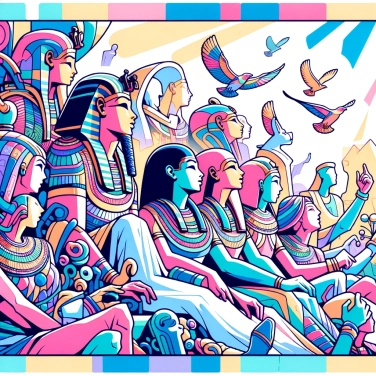The discovery of Tutankhamun's tomb fascinated the entire world because of its incredible wealth in treasures, its excellent preservation, and the mystery surrounding the early death of the young pharaoh.

For thousands of years, almost all royal tombs were looted by gold-hungry thieves immediately after their closure. The tomb of Tutankhamun, by miracle, escaped this fate. When Howard Carter opened the tomb in 1922, he discovered an intact space, frozen in time for over 3,000 years. It was unprecedented. Nothing had moved since the time of the young pharaoh: his sarcophagus, his personal belongings, all the ceremonial objects were there, placed exactly as the priests had left them. An incredible discovery that provided archaeologists with a rare glimpse into the culture and funerary rites of ancient Egypt.
The tomb of Tutankhamun was filled with thousands of objects of incredible wealth, most covered in gold and precious stones. Among them, the main role obviously belongs to the famous solid gold funerary mask, inlaid with lapis lazuli, quartz, obsidian, and turquoise. Archaeologists also discovered valuable furniture covered in gold, carved chests, richly decorated chariots, and even ancient board games. There were also hundreds of magical amulets, incredible jewelry such as bracelets, necklaces, and rings, made with astonishing craftsmanship. Not to mention wonderful and lifelike statues, intended to accompany and protect the young pharaoh in the afterlife. All of this revealed to the world the incredible splendor of ancient Egyptian art and the symbolic power associated with the pharaohs.
Shortly after the exceptional discovery of Tutankhamun's tomb, intriguing rumors begin to circulate. It is said that a mysterious curse has struck those who entered the tomb. The press quickly goes wild, especially after the death of Lord Carnarvon, the patron of the expedition, who died shortly after the tomb was opened from an infection caused by a simple mosquito bite. Obviously, it is impossible to know exactly where this curse narrative comes from, but it immediately captivates the public. The legend takes hold in popular culture, blending fascination, fear, and curiosity. This so-called bad luck, without any real scientific evidence, greatly contributes to the myth surrounding the discovery of the pharaoh and makes the story even more fascinating in the eyes of the world.
From the moment the discovery was announced in 1922, the story of Tutankhamun's tomb became instantly viral. Newspapers around the world published spectacular photos and exuberant accounts of the riches and mysteries that had just been revealed. Everyone wanted to know what lay behind the entrance of the tomb that had remained intact for over three thousand years. The pharaoh, previously almost unknown to the general public, suddenly became a true superstar: he was discussed in the streets, on the radio, and at dinner tables everywhere. This massive popular interest also explains the birth of a genuine "Egyptomania" in fashion, decor, cinema, and even literature. Tutankhamun thus became more than a historical discovery; he was truly a global cultural phenomenon.
The discovery of Tutankhamun's tomb triggered a real boom for archaeology and Egyptology. From the 1920s onwards, many aspiring Indiana Joneses ventured into the desert, hoping to unearth new lost treasures. Universities opened programs dedicated to the study of ancient Egypt, and a host of new researchers arrived on the scene. This renewed general interest even prompted governments to fund more excavations and to better protect the ruins. Museums were created everywhere, showcasing mummies and ancient treasures, making History accessible to everyone. Gradually, the mysterious and exotic image of ancient Egypt became a true popular cultural phenomenon.
The famous "pharaoh's curse," widely amplified by the media at the time, is actually based on coincidences: it is statistically proven today that there were no more premature deaths among the teams that worked on this discovery than elsewhere.
The gold funeral mask of Tutankhamun, weighing approximately 10 kg, has become a globally recognized cultural and artistic icon, symbolizing ancient Egypt and inspiring films, books, and exhibitions around the world.
Howard Carter, the archaeologist who discovered the tomb in 1922, took nearly ten years to catalog all the treasures found in the burial chambers.
Contrary to popular belief, Tutankhamun was a relatively insignificant pharaoh who died very young, around the age of 18 or 19, but it is the exceptionally intact state of his tomb that made him world-famous.
Yes, the tomb of Tutankhamun, located in the Valley of the Kings, is now open to the public. However, for preservation reasons and to prevent wear and alteration caused by the many visitors, the authorities sometimes limit access or strictly regulate the conditions of the visit.
Howard Carter was a British archaeologist. He conducted research in Egypt for a long time, culminating in his famous discovery of the tomb of Tutankhamun in the Valley of the Kings. He was both the principal discoverer and in charge of the excavations.
No scientific evidence validates the existence of this curse. This legend has primarily been built upon a series of coincidences and myths that were publicized after the discovery of the tomb. Today, it is clear that this story is more a matter of folklore than historical reality.
Although his tomb is world-famous, the reign of Tutankhamun was brief (about ten years) and relatively discreet in terms of politics and architecture. He ascended to the throne at a very young age, around nine years old, and died at around eighteen or nineteen, without having had the opportunity to make a significant mark on history.
The initial discovery by Howard Carter took place in November 1922. However, the complete excavation, study, and meticulous cataloging of the objects found in the tomb took nearly another ten years, concluding in 1932.
The majority of the treasures discovered in the tomb are kept at the Egyptian Museum in Cairo. However, some pieces travel regularly to various museums around the world during exceptional cultural events as part of temporary exhibitions.

0% of respondents passed this quiz completely!
Question 1/5